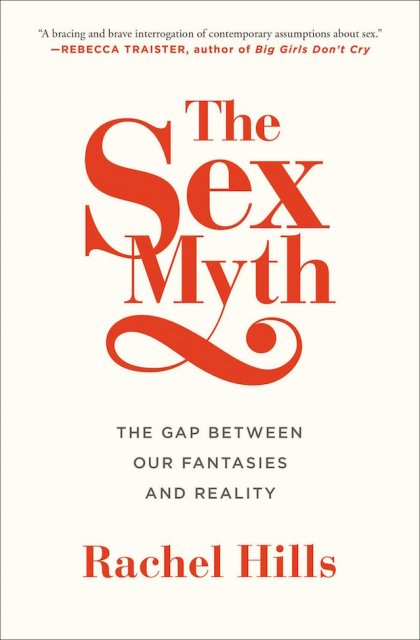Sex has a defining place in society and identity, but maybe, argues Rachel Hills in The Sex Myth: The Gap Between Our Fantasies and Reality, it shouldn’t.
The Sex Myth is based on two ideas — first, that our society is hypersexualized, and that being sexually liberated within it means having sex one specific way; and second, that sex is the most valuable, pleasurable, important and defining thing we can do — two ideas that Hills argues mean our sex lives are more regulated than ever even as they appear to be freer than ever. It is not simply enough to be having sex, though obviously everyone is, and everyone is defining it the same way; sex needs to be socially condoned, two to three times a week minimum (but not too much), spontaneous, in different places and positions, adventurous but not too adventurous, kinky but not kinky-kinky, ending in orgasm, and ultimately interesting. This, Hills argues, is evident in everything from the way we exaggerate or self-censor when we talk about sex with friends to the way we manage our appearances to the way we view others and ourselves.
Though the bulk of the sources Hills draws on are centered around heteronormativity and monogamy, it would be inane to believe that queer people escape this type of thinking. The number of respondents asking some variation of “Am I normal?” in the Ultimate Lesbian Sex Survey indicates that, though some of the details may differ, we are just as susceptible as anyone else.
Hills argues that rather than worrying about what sex looks like, we should worry about the singular importance we assign it, and move towards thinking about it as just like anything else. The Sex Myth will make you rethink the way you think about the role of sex in your life, whatever it looks like.
Not convinced? Don’t have time? The following nine quotations illustrate the philosophy beneath The Sex Myth, and how to fight it.

1. Culture demands we speak sex aloud in the name of liberation.
“In the fifty years since the sexual revolution, there have been concrete changes in what we know about sex and the scope of the behaviors we engage in. But the most significant transformations in the was that we engage with sexuality have taken place inside our heads. They are less about what we do than they are about the way we think about sex — about the types of behavior we celebrate and those we condemn. We have moved from a culture that demanded we keep sexuality hidden from view to one that demands we speak it out loud in the name of liberation.”
2. Repression is sexy.
“[F]or many of us, sexuality is still intimately entwined with questions of freedom and resistance.
Partly, this is because the ways in which we are sexual are still limited by culture and politics — especially for those of us who are women, gay or lesbian, or transgender, or whose sexual expression falls outside the continuum of what is considered to be ‘normal’ or desirable. But there is another reason we are able to hold two seemingly contradictory positions — the feeling of being unprecedentedly free and that of being unfairly oppressed — at the same time. And that’s because there is something kind of sexy about the idea that our sexuality is being repressed.”
3. Regulation is still regulation.
“Where once we were condemned for being too sexual, today we are admonished for not being sexual enough. Where it was considered perverse to engage in any activity more adventurous than the missionary position, today you risk being labeled boring if you don’t. In our attempt to overturn the rules that once governed our sexuality, we have replaced one brand of regulation with another.”
4. Sex is seen as consumable.
“[A]n active sex life doesn’t only satisfy us erotically; it represents desirability, self-agency, and charisma. If consumer culture trades on the promise that we will find ourselves through the items we purchase, consumer sex promises that we will discover ourselves through sex. Who we sleep with, what we desire, and the acts we engage in are all part of a broader expression of personal taste.”
5. “Normal” doesn’t make sense.
“For a word that is so central to how we understand sex, what we consider to be normal is surprisingly amorphous. In its most literal sense, what’s ‘normal’ is a matter of statistics: an objective measure of how frequently a given experience, attitude, or behavior occurs within a population. In a medical setting, normality is synonymous with health and abnormality with disease and dysfunction. Culturally speaking, what qualifies as normal and what doesn’t is a reflection of shared values and assumptions. People and practices that are held in high esteem are usually also labeled ‘normal,’ whether their experiences are common or not, while those that are regarded with suspicion and contempt are labeled ‘abnormal.’ Normality, in this social context, is a synonym for ‘okay,’ while abnormality is equated with perversion or defect.”
6. Also we are all using the word “normal” incorrectly.
“What is ‘normal’ is not a value judgment in and of itself. In any group of people, some beliefs, experiences, and physical traits will be more common than others – there will be an average height, for example, and an average number of friends and acquaintances. The issue arises from the moral and emotional weight that we attach to these numbers, when we start using them as a guide not just for what is, but for what we should be.”
7. “Good sex” is whatever sex feels good to your body in that moment.
“If there is anything ‘dysfunctional’ about out current approach to sex, it does not reside in our bodies, but in the way that we perceive sex and sensuality.
We treat sex as something that can be mechanized and perfected, through the acquisition of skills and techniques, the development of ‘signature moves,’ and a focus on the performance of pleasure rather than the sensation of it. But the problem is not that we are ‘doing it wrong.’ It is that we have been told that there are only a handful of very specific ways to do it right. That ‘good sex’ is whatever looks sexy through a camera or sounds exciting written down on the page, rather than what feels good in our bodies in the moment.”
8. You are not your sexual history.
“Our sexual histories are not unblemished mirrors of our souls but an ever-changing and unpredictable series of events that, while they may have meaning in our lives at any particular moment, do not define us.”
9. Sex is neither inherently good nor bad.
“[S]ex is neither inherently good nor bad; neither intrinsically empowering nor oppressive. We don’t need to bottle it up and restrict its use in order to keep ourselves safe, but neither do we need to worship it on order to set ourselves free. And just as attempts to reframe sex as a transcendent, emancipating force haven’t made it free from cultural regulation, nor will problematizing it as a ‘negative’ force eliminate the pressure to be sexual in particular, socially desirable ways.
Dismantling the Sex Myth means seeking a previously unarticulated middle ground, one that is neither blindly affirming nor formidably fearful. It means embracing sex not as a source of transcendence or transformation, but as sociologist Stevi Jackson puts it, ‘as part of the fabric of routine day-to-day social life,’ an act like any other.”







